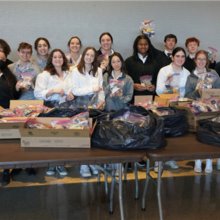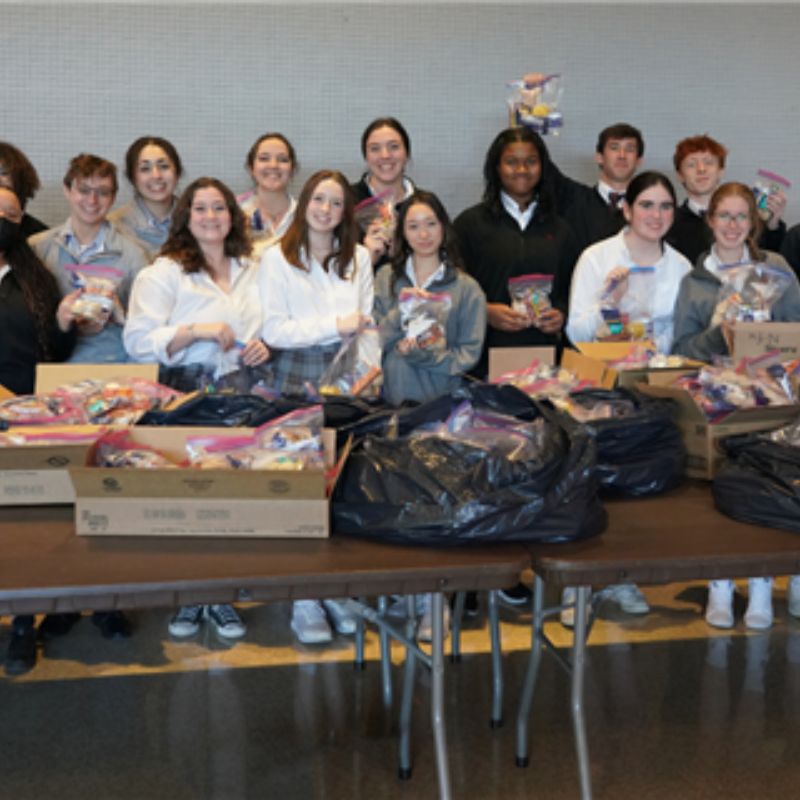
During the week of March 6, the St. John’s community observed its 15th annual Poverty Education Week.
View photos:





Rooted in themes of Catholic social teaching and Lasallian education, Poverty Education Week educates and inspires the SJC community to fight systemic injustices, providing opportunities for students, families, faculty, and staff to participate in assemblies, classroom presentations, poverty-related lessons, guest-speaker presentations, and the annual mission drive to benefit our twin school, the Child Discovery Centre in Nakuru, Kenya.
On March 6, Bro. Oscar Okoth, administrator of the Child Discovery Centre, shared his experience at the CDC via Zoom with SJC’s Lasallian Youth. He discussed how the CDC has evolved from a modest food program to a full-service boarding center and outreach program for children in grades 6 through 12. With a focus on education, the CDC addresses a variety of basic human needs including food, shelter, hygiene supplies, school materials, and more. Bro. Oscar described their daily schedule and children they serve. Many of the CDC students are orphaned, come from economically challenged homes, are “street children,” and/or suffer from abuse and trauma. Brother thanked the St. John’s community for their continued generous support stating, “You are all part of the miracle—the sacrifices you make each day for us. Please share what you can.” He then cited the CDC’s current urgent needs:
- Technology for a small computer lab
- Mattresses and bedding
- School fees to cover textbooks and school lunches
- Kitchen upgrades to include clean energy to promote improved hygiene, safety, and to combat local deforestation
- A permanent mental health counselor to assist students with daily struggles
On March 7, Rachelle Ellison and Cassandra Staton from the National Coalition for the Homeless (NCH) spoke to junior and senior religion classes sharing information and statistics about the types and top causes of homelessness including lack of affordable housing and domestic violence. They shared inspiring personal experiences of how they overcame homelessness and the problems that plagued their younger lives and answered student questions. They further emphasized that people do not choose to be homeless; it is a consequence of abuse, trauma, addiction, job loss, mental health issues, and violence. When describing the different aspects of her advocacy work, Ellison said, “I want to make a difference in someone’s life, day by day by day. Your blessings are yours to keep but your gifts must be shared.”
On March 8, faculty and students participated in an all-day technology fast, abstaining from the use of technological devices including iPads, projectors, and computers, as an act of solidarity with those who do not have access to technology or reliable Internet connections. During lunch periods, students were served a modest portion of grains and legumes— reflecting the UN World Food Programme’s ration distribution for refugee camps and humanitarian crises— as an act of solidarity with the 80% of the global population living with food insecurity. Each lunch period began with a presentation about food insecurity led by SJC faculty members Olivia Booth, Kate Fernandez, Dan Pier, and Jeanne Vosseller. Mothers’ Club volunteers served the food and helped with the sale of student-made bowls that will benefit the CDC.
On March 9, a small group of Cadets participated in a full-day in-house service opportunity with So Others Might Eat (S.O.M.E), an organization that strives to break the cycle of poverty and homelessness through their comprehensive “whole person care” approach. Daryl Wright, SVP of community outreach; Megan Fragola, special events coordinator; and Colby Mullen, individual philanthropy officer, shared their personal stories and why they work for S.O.M.E. Each spoke with the students about social injustice, highlighting the differences between social justice and charity, and equality versus equity. Students then engaged in educational activities, packed more than 300 snack bags, and created a “Jeopardy” game for S.O.M.E’s senior services center.
During lunch periods on March 10, students made 600 sandwiches to support Martha’s Table, an organization that supports strong children, strong families, and strong communities by increasing access to quality education programs, healthy food, and family supports. In addition to each day’s programming, all classes incorporated topic-related lessons, and many departments provided supplementary educational initiatives for the school community. Student-made exhibits on the plight of the poor were displayed around campus, and food- and microwave-safe ceramic bowls were sold during Wednesday’s Mean of Solidarity. Each morning, the Counseling Department shared themed prayers and statistics during homeroom announcements.
This year, Director of Library Services Laura Turowski created an exhibit, “What’s Homelessness Really Like?”, featuring stories of more than 30 individuals experiencing homelessness in America. The display, representing stories from teenagers, adults, and senior citizens, helped students gain a deeper understanding of what it’s like to be homeless, how people get by each day, find shelter, seek help from friends, and find joy in their lives. The stories were from a New York Times feature by Susan Shain and Aidan Gardiner.
For 15 years, St. John’s faculty and staff have been intentionally drawing students’ attention to the needs of the economically poor and educating them about the systemic causes of poverty. As a community, we are ever more aware of the truth of Jesus’ statement, ‘The poor you will always have with you.’ Matt.26:11. This unfortunate reality is a call for us to engage in relationships of solidarity, realizing that it is we who are being served. In these relationships, and in our service, students learn that we encounter Christ and are vehicles of His love for the most vulnerable,
said Tom Sipowicz, director of mission integration.





